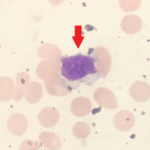A diagnosis of LGL usually involves leucopenia, but not always. The LGL cells are typically seen in a peripheral smear or bone marrow, he said. Most likely, Felty’s is a polyclonal LGL syndrome, which becomes an LGL diagnosis when it becomes monoclonal, Dr. Coblyn noted.
In this case, a 65-year-old woman with a history of seropositive, erosive RA had tried a variety of treatments without much response, but then was diagnosed with Felty’s syndrome after increased leucopenia. The initial treatment included high-dose prednisone and cyclic cyclophosphamide, on which she did better. But the anemia and leucopenia continued.
Her RA got worse and Dr. Coblyn said he suggested using rituximab for both her RA and her LGL. Since then, the therapy has been effective.2
“We ended up collecting in-house about seven patients with RA and LGL, all treated with rituximab,” he said. “And virtually all of them did excellently in terms of their LGL, and most of them with their RA.”
RA & Vasculitis
Dr. Coblyn said physicians need to be aware of vasculitis in patients with seropositive RA using steroids, often without disease-modifying anti-rheumatic drugs, who present with skin lesions or mononeuritis multiplex, among other manifestations.
Treatment may include steroids and immunosuppressive drugs. And the literature is growing on the use of rituximab.
Thomas R. Collins is a freelance writer living in South Florida.
References
- Matsunaga S, Sakou T, Onishi T, et al. Prognosis of patients with upper cervical lesions caused by rheumatoid arthritis: Comparison of occipitocervical fusion between c1 laminectomy and nonsurgical management. Spine (Phila Pa 1976). 2003 Jul 15;28(14):1581–1587.
- Cornec D, Devauchelle-Pensec V, Jousse-Joulin S, et al. Long-term remission of T-cell large granular lymphocyte leukemia associated with rheumatoid arthritis after rituximab therapy. Blood. 2013 Aug 29;122(9):1583–1586.



